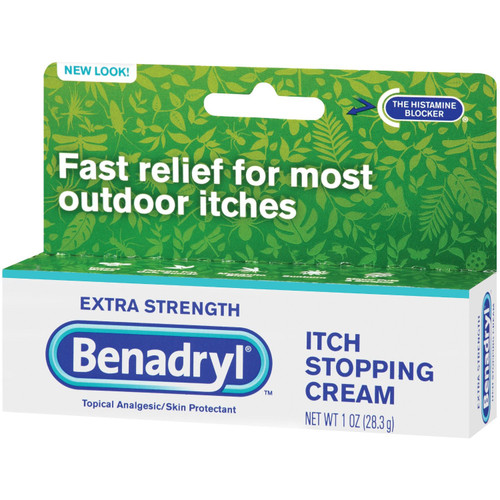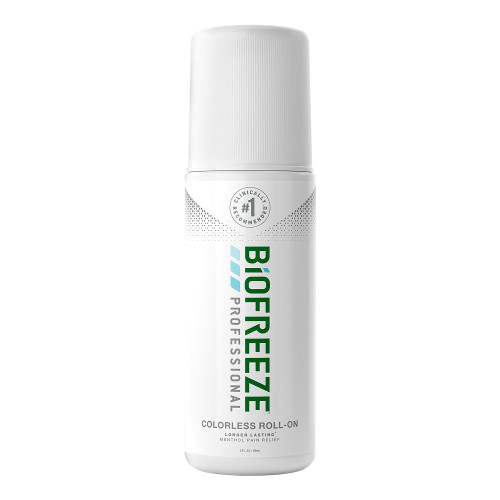-

Dynarex
dynarex Antifungal Cream - 1% Clotrimazole Treats Yeast Infections, 1 oz
Effectively treats athletes foot, vaginal yeast infections, jock itch, fungal infections of the fingers and toes
As low as $11.58 -

Dermarite
DermaSarra Camphor Menthol Lotion, Soothing Itch Relief, 7.5 oz
DermaSarra lotion is an external analgesic that provides temporary relief from itching associated with minor skin irritations such as: dry skin, poison ivy, poison oak, poison sumac, insect bites, detergents and sunburn. 0.5% strength camphor and 0.5%...
As low as $8.98 -

CareAll
CareALL Hydrocortisone Anti-Itch Cream, Long-Lasting Itch Relief, 1 oz
Long-lasting hydrocortisone cream for your worst itch symptoms from eczema, psoriasis, seborrheic, dermatitis and rashes. 1% strength hydrocortisone.Temporarily relieves itching associated with minor skin irritations, inflammation, redness and rashes due...
As low as $10.13 -

Water Jel
Water-Jel Hydrocortisone Cream - Rash and Itch Relief, 0.9 g Packet
1% strength hydrocortisone for temporary relief of itching associated with minor skin irritations and rashes.Hydrocortisone cream relieves skin discomfort caused by eczema, psoriasis, contact dermatitis, prickly heat rash, and insect bites and stings...
As low as $12.00 -

Span America
Selan+ AF Antifungal Cream, Miconazole Nitrate, Dimethicone, Zinc Oxide, 4 oz
The zinc oxide and dimethicone ingredients combine to provide a moisture barrier to protect the skin from external moisture, while the miconazole nitrate treats fungal infections.Provides a moisture barrier to protect the skin from external moisture,...
As low as $16.53 -

Geri-Care
Geri-Care Tolnaftate Antifungal Foot Powder, Athlete's Foot Treatment, 1.5 oz
1% strength tolnaftate cures and prevents most athlete's foot.Super absorbent Compare to active ingredient in Tinactin Tinactin is a registered trademark of Bayer Consumer Health
As low as $13.24 -

BENADRYL
Benadryl Itch Relief Cream 1 oz Tube
Get itch relief from Benadryl with this antihistamine cream that also protects skin. 2% diphenhydramine hydrochloride, 0.1% zinc acetate.Temporarily relieves pain and itching associated with insect bites, minor burns, sunburn, minor skin irritations,...
$14.16 -

Dynarex
dynarex Hydrocortisone Cream, Rash and Itch Relief for Skin Irritations
A 1% strength hydrocortisone cream, dynarex Hydrocortisone Cream is designed for temporary relief of minor skin irritations and rashes due to eczema, insect bites, soaps and cosmetics.Hydrocortisone reduces the swelling, itching, and redness that can...
As low as $10.29 -

Smith & Nephew
Secura Antifungal Cream, 2% Miconazole Nitrate for Athlete's Foot
Use this Secura 2% Strength Antifungal Cream to effectively treat athlete's foot, jock itch or ringworm. The cream can also be used to treat yeast infections (candidiasis). The cream creates a reliable moisture barrier and includes miconazole nitrate for...
As low as $12.46 -

Biofreeze
Biofreeze Professional Colorless Roll-on Pain Relief 3 oz
Performance Health Biofreeze Professional is easy to apply and is absorbed quickly for effective pain relief. It will help with issues such as strains, sprains and other aches, so you can get back to your active lifestyle. Biofreeze Professional Pain...
As low as $16.98 -

Biofreeze
Biofreeze Professional 360 Pain Relief Spray - Fast Acting Menthol, 4 oz
Clinically optimized to provide those who use it with a longer-lasting experience and easier application due to its smoother consistency compared to the traditional Biofreeze formula.10.5% menthol Provides highly effective short-term pain relief...
As low as $18.07 -

Biofreeze
Biofreeze Professional Pain Relief Gel for Sore Muscles, Sprains and Strains
Provide cool and effective relief with Biofreeze Professional Gel. It soothes soreness and is a long-lasting, fast-acting formula that can be used on most areas of your body. Biofreeze Professional pain relieving gel does not contain any narcotic...
As low as $37.16
Over the Counter

Over the Counter
Over-the-counter (OTC) remedies make it possible to treat many minor health ailments at home. These medicines are available without a prescription. So you can stock up before you need them and have them handy for when the need arises. A well-stocked medicine cabinet or first aid kit should include medicines from these categories of OTC drugs.
Antifungals
Antifungal creams, powders, and lotions contain ingredients that can help ease the itch and other symptoms associated with fungal infections such as athlete's foot, jock itch, and ringworm. Some may also help relieve insect bites, psoriasis, eczema or seborrheic dermatitis, and other skin irritation. These products contain active ingredients such as hydrocortisone to reduce inflammation plus clotrimazole or other antifungals. You apply them topically, directly to the irritated area.
Cough & Cold
Cough, congestion, sore throat, and other symptoms with the common cold and other minor viruses aren't serious but can be uncomfortable. While colds seem more frequent during the winter months, they can occur any time of year. So, it's a good idea to have products such as cough syrup, lozenges, sore throat spray, and mucus relief tablets handy year-round.
Ear & Eye Care
Ears and eyes are vulnerable to irritation and inflammation. Ear wax buildup can make ears feel clogged or even can lead to infections. Ear wax remover drops or ear wash systems can help soften, loosen and remove ear wax. In addition, eye drops can ease redness and irritation in the eyes due to allergies, dryness, dust, or other irritants.
Laxatives
Laxatives, stool softeners, suppositories, and fiber supplements help ease constipation and encourage more regular bowel movements. The type of product to use generally depends on the severity of symptoms.
Oral laxatives may be in pill, liquid, or powder that you can stir into water or another beverage. The design provides occasional relief of mild symptoms.
Suppositories are more fast-acting and may be more appropriate for more serious symptoms. If constipation is an ongoing issue, your doctor may recommend taking a fiber supplement regularly to help encourage healthy digestion.
Pain Relief
Headaches, backaches, sprains and strains, toothaches, and fevers can strike unexpectedly. So it's always a good idea to have a supply of oral pain relievers such as aspirin, ibuprofen, naproxen sodium, or acetaminophen. These medications can help ease minor aches, pains, and fevers.
It can be helpful to stock up on topical pain relief agents, as well. These include pain-relief creams, gels, sprays, and patches that you can apply directly to an area that feels sore, such as a backache or muscle strain, to get fast relief.
As you stock your medicine cabinet, it's important to remember that over-the-counter medicines can sometimes have interactions with other drugs, and some may not be right for people with certain health conditions. Talk with your healthcare provider about all medications you take, including OTC remedies and even supplements. Follow dosing instructions carefully and take medications only as directed.
Over-the-counter (OTC) remedies make it possible to treat many minor health ailments at home. These medicines are available without a prescription. So you can stock up before you need them and have them handy for when the need arises. A well-stocked medicine cabinet or first aid kit should include medicines from these categories of OTC drugs.
Antifungals
Antifungal creams, powders, and lotions contain ingredients that can help ease the itch and other symptoms associated with fungal infections such as athlete's foot, jock itch, and ringworm. Some may also help relieve insect bites, psoriasis, eczema or seborrheic dermatitis, and other skin irritation. These products contain active ingredients such as hydrocortisone to reduce inflammation plus clotrimazole or other antifungals. You apply them topically, directly to the irritated area.
Cough & Cold
Cough, congestion, sore throat, and other symptoms with the common cold and other minor viruses aren't serious but can be uncomfortable. While colds seem more frequent during the winter months, they can occur any time of year. So, it's a good idea to have products such as cough syrup, lozenges, sore throat spray, and mucus relief tablets handy year-round.
Ear & Eye Care
Ears and eyes are vulnerable to irritation and inflammation. Ear wax buildup can make ears feel clogged or even can lead to infections. Ear wax remover drops or ear wash systems can help soften, loosen and remove ear wax. In addition, eye drops can ease redness and irritation in the eyes due to allergies, dryness, dust, or other irritants.
Laxatives
Laxatives, stool softeners, suppositories, and fiber supplements help ease constipation and encourage more regular bowel movements. The type of product to use generally depends on the severity of symptoms.
Oral laxatives may be in pill, liquid, or powder that you can stir into water or another beverage. The design provides occasional relief of mild symptoms.
Suppositories are more fast-acting and may be more appropriate for more serious symptoms. If constipation is an ongoing issue, your doctor may recommend taking a fiber supplement regularly to help encourage healthy digestion.
Pain Relief
Headaches, backaches, sprains and strains, toothaches, and fevers can strike unexpectedly. So it's always a good idea to have a supply of oral pain relievers such as aspirin, ibuprofen, naproxen sodium, or acetaminophen. These medications can help ease minor aches, pains, and fevers.
It can be helpful to stock up on topical pain relief agents, as well. These include pain-relief creams, gels, sprays, and patches that you can apply directly to an area that feels sore, such as a backache or muscle strain, to get fast relief.
As you stock your medicine cabinet, it's important to remember that over-the-counter medicines can sometimes have interactions with other drugs, and some may not be right for people with certain health conditions. Talk with your healthcare provider about all medications you take, including OTC remedies and even supplements. Follow dosing instructions carefully and take medications only as directed.
